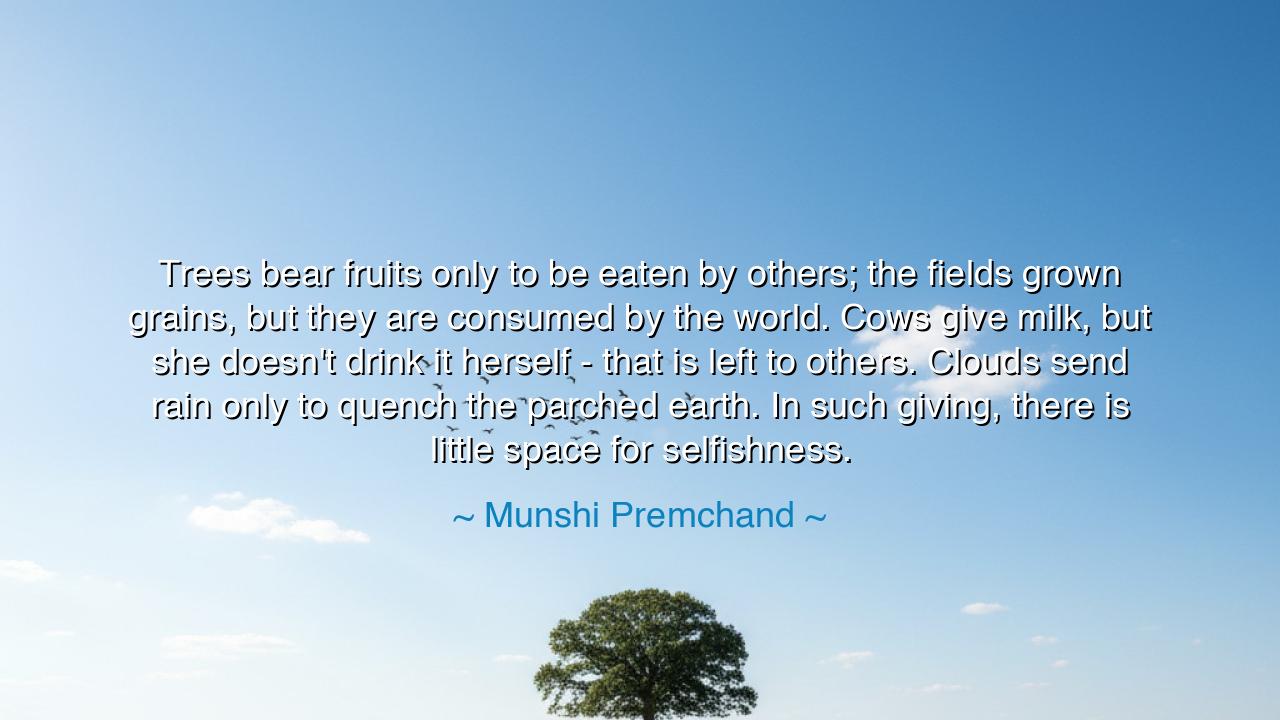
Trees bear fruits only to be eaten by others; the fields grown
Trees bear fruits only to be eaten by others; the fields grown grains, but they are consumed by the world. Cows give milk, but she doesn't drink it herself - that is left to others. Clouds send rain only to quench the parched earth. In such giving, there is little space for selfishness.






Hear now the noble words of Munshi Premchand, the sage of the people, who declared: “Trees bear fruits only to be eaten by others; the fields grow grains, but they are consumed by the world. Cows give milk, but she doesn’t drink it herself—that is left to others. Clouds send rain only to quench the parched earth. In such giving, there is little space for selfishness.” These words, wrapped in simplicity, shine with eternal truth. They remind us that the highest law of life is not grasping, but giving; not hoarding, but pouring oneself out for the good of others.
The meaning is clear: nature itself teaches us generosity. The tree does not eat its own fruit, nor does the cloud drink its own rain. The cow does not hoard her milk, nor do the fields swallow their own harvest. Instead, every part of creation lives for the benefit of another. The universe thrives because of this endless circulation of giving, and in this pattern, man too must find his way. To live for oneself alone is to betray the rhythm of creation; to live for others is to walk in harmony with the cosmos.
The origin of Premchand’s saying lies in his profound concern for society, especially the poor and the oppressed of India. He witnessed exploitation, greed, and selfishness, yet also saw the quiet endurance of farmers, laborers, and mothers who gave endlessly without recognition. In his writings, he sought to awaken the conscience of his readers, reminding them that true greatness lies not in wealth or possession, but in selfless giving. His parable-like vision of trees, fields, cows, and clouds becomes a moral lesson for all generations: that humanity must mirror the generosity of nature.
History, too, gives us living examples. Think of Mother Teresa, who, like the rain, poured herself out upon the thirsty soil of Calcutta, caring for the sick and abandoned without seeking reward. Or recall King Ashoka, who, after witnessing the horrors of war, dedicated his reign not to conquest, but to welfare, building hospitals, planting trees, and spreading compassion. These figures embody the truth Premchand spoke: that the worth of life is measured not by what we keep, but by what we give.
The danger, however, is ever-present: selfishness whispers in every human heart. It tells us to store away the fruits of our labor, to think only of our own hunger, to ignore the thirst of others. But Premchand warns us that such a path is unnatural. Just as a tree that refuses to give fruit becomes barren, so too does a soul wither when it hoards. Life flows through giving, and stagnates in selfishness.
The lesson for us, children of today and tomorrow, is both simple and profound. Do not wait to be rich or powerful before you begin to give. Give as the tree gives, without calculation; give as the cloud gives, without waiting for thanks. A kind word, a shared meal, a helping hand—these are fruits as precious as any harvest. Each act of giving aligns you with the eternal law that governs earth and sky.
Practical action is within the reach of all. Share your skills, your time, your resources, your compassion. If you have knowledge, let it nourish another. If you have strength, use it to lift the weary. If you have wealth, let it flow to where it is needed most. And if you have little, remember the tree, the cow, the cloud: even the smallest offering sustains life.
Take this as a guiding flame: in giving, there is no loss. The fruit that is shared multiplies in joy; the rain that is spent returns in season; the milk that nourishes another gives meaning to the cow’s existence. So too with us: in selfless giving, we find the highest truth of life, and in it, we become part of the eternal harmony of the world.






AAdministratorAdministrator
Welcome, honored guests. Please leave a comment, we will respond soon